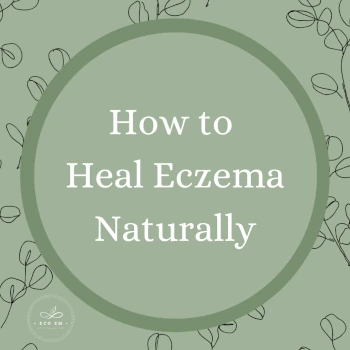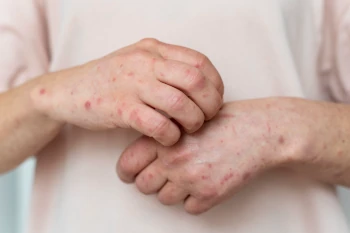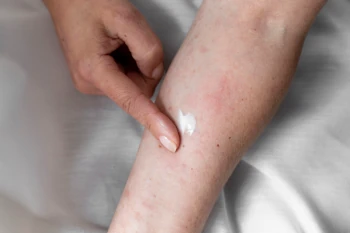Nurturing Skin Health: Eczema
![]()
ECO EM’S BLOG
NURTURING SKIN HEALTH: ECZEMA
![]()
 Every week throughout October I’ll be focusing on a common skin condition. Having visited many a market and met some gorgeous people over the last couple of years, I have begun to understand how our skin is pivotal in how we feel about ourselves.
Every week throughout October I’ll be focusing on a common skin condition. Having visited many a market and met some gorgeous people over the last couple of years, I have begun to understand how our skin is pivotal in how we feel about ourselves.
It’s our biggest organ and one that covers our whole bodies. This is what can you make feel super shy and not at all confident as you battle a myriad of conditions. Some of these can be treated with a change of diet, natural remedies, and sunshine. Others are so severe, that I’ve had customers say they didn’t want to leave the house.
My hope is that with each post I help to uncover some of the common questions, and misconceptions and provide suggestions which may help in some way. If you are suffering at this moment in time, please reach out and I will do my best to see if I can help in any way.
Now onto this week’s post which focuses on Eczema…
Millions of individuals throughout the world suffer from the skin ailment eczema, also known as atopic dermatitis. Eczema, which is characterised by dry, itchy, and inflammatory skin, can be a difficult condition to control. In this article, we’ll suggest various all-natural treatments for eczema and provide answers to frequently asked questions concerning its causes, symptoms, and available therapies.
TYPES OF ECZEMA:
 There are various types of eczema, but the most prevalent is atopic eczema (atopic dermatitis). It’s characterised by skin that is:
There are various types of eczema, but the most prevalent is atopic eczema (atopic dermatitis). It’s characterised by skin that is:
- Itchy
- Dry
- Cracked
- Sore
On lighter skin, inflamed areas can appear red, while on darker skin, they may manifest as darker brown, purple, or grey patches. Atopic eczema can affect any part of the body, but it often appears on the:
- Hands
- Insides of the elbows
- Backs of the knees
- Face
- Scalp
WHAT CAUSES ECZEMA?
 The exact cause of eczema remains a mystery. When I go to markets and craft shows, it’s one of the main skin conditions I talk about with the customers. It frequently has connections to stress, allergies, and weather. Those who suffer from eczema often have an overactive immune system that reacts to stimuli by inflaming the affected area, resulting in red, itchy, and painful skin. Eczema usually co-occurs with conditions like asthma and hay fever, and genetics may also play a factor. People with a family history of eczema or other allergic conditions are more susceptible.
The exact cause of eczema remains a mystery. When I go to markets and craft shows, it’s one of the main skin conditions I talk about with the customers. It frequently has connections to stress, allergies, and weather. Those who suffer from eczema often have an overactive immune system that reacts to stimuli by inflaming the affected area, resulting in red, itchy, and painful skin. Eczema usually co-occurs with conditions like asthma and hay fever, and genetics may also play a factor. People with a family history of eczema or other allergic conditions are more susceptible.
WHAT GETS RID OF ECZEMA FAST?
Unfortunately, there is no quick fix, self-awareness and preventative measures are required for managing eczema. However, certain methods can aid in offering prompt relief:
- Moisturise: Keeping your skin well-hydrated is essential. Consider using natural products like coconut oil, aloe vera, or sunflower seed oil to lock in moisture. The Ultra Pro Face Cream and Body Lotion bar have had fantastic feedback from customers with eczema. Reapplying throughout the day to prevent dryness when the skin starts to feel tight or uncomfortable.
- Topical Treatments: Over-the-counter creams and ointments containing hydrocortisone can provide quick relief from itching and inflammation. Consult your doctor for prescription-strength options if needed.
- Avoid Triggers: Identifying and avoiding triggers such as certain materials, stress, detergents, or allergens can prevent flare-ups.
- Keep a Diary: Record potential triggers such as metals, soaps, fragrances, antibacterial lotions, shampoo, body wash, dietary choices, and emotional stress.
- Bath Remedies: Adding oats or baking soda to your bath can help soothe itchy skin.
WHAT FOODS TO AVOID IF YOU HAVE ECZEMA?
For some people, managing their eczema may involve changing their diet. Although triggers differ from person to person, the following common foods could be causing flare-ups:
- Dairy: Some eczema sufferers may have sensitivities to dairy foods, such as cheese, milk, and butter.
- Gluten: Gluten intolerance occasionally makes eczema symptoms worse.
- Processed Foods: Foods that are highly processed and high in sugar might cause flare-ups.
To ascertain whether dietary changes are required for the management of your eczema, it is imperative that you visit a doctor. It’s advised to keep a food diary to see whether there are any links to particular food groups.
WHEN TO SEE A DOCTOR?
Consult a doctor if:
- Your eczema is spreading.
- It has become infected.
- It doesn’t respond to natural treatments.
Even though managing eczema can be difficult, there is hope. Understanding the underlying causes and potential food triggers can help with long-term management while natural solutions like moisturisers and topical treatments can offer immediate relief. A doctor should always be consulted for specific advice on managing eczema and if you have any cause for concern.
I welcome your questions and feedback. If there is anything that I haven’t answered above or included, please let me know. You can reach out through the website or get in touch via Instagram or Facebook.
Thank you for reading this weeks blog, Nurturing Skin Health: Eczema.
Peace and love,
Eco Em xx
